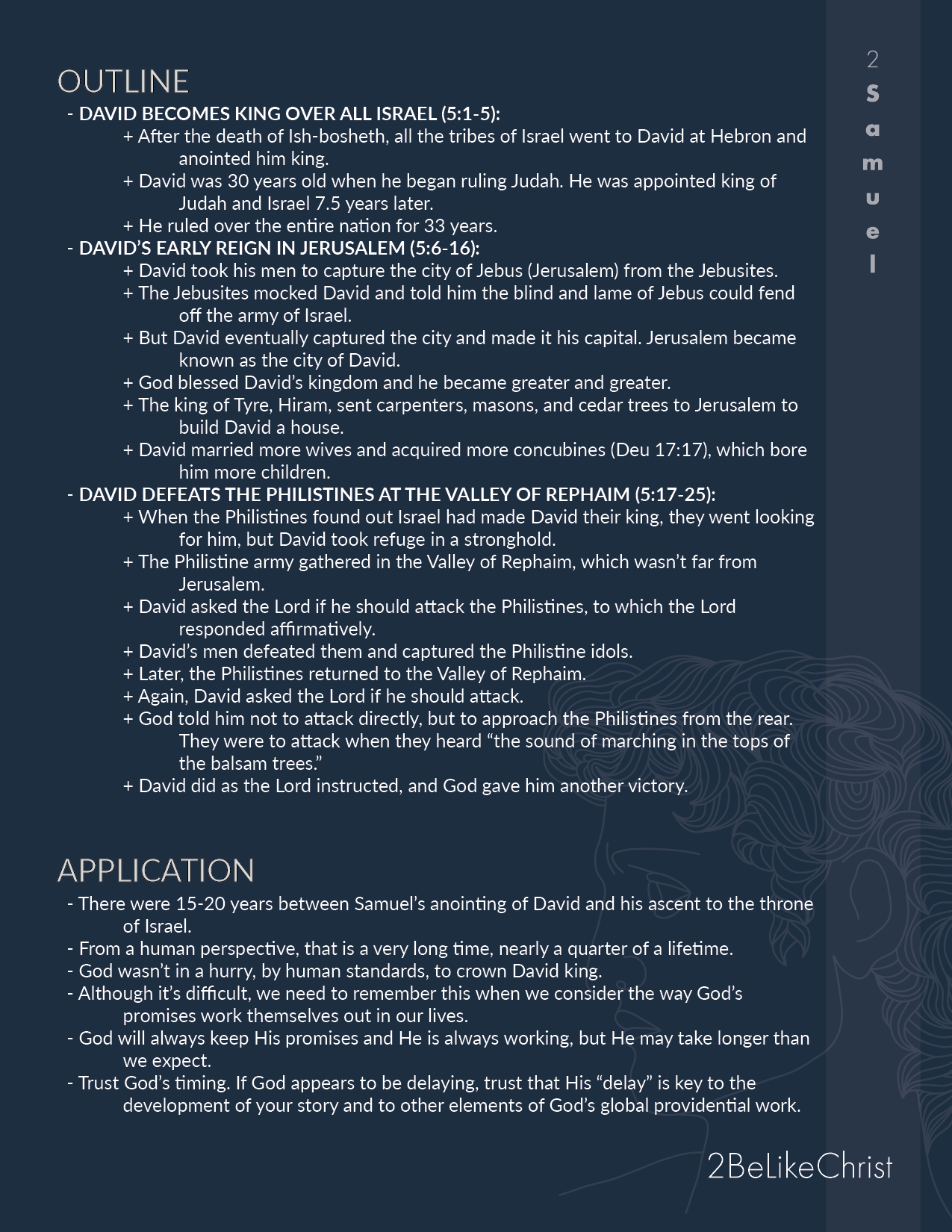2 Samuel 5 Explained – A 5 Minute Bible Study
2 Samuel 5 Summary - A Quick Overview
WHEN:
Saul died in approximately 1055 B.C., after reigning over Israel for 40 years.
David became king over Judah the same year. He reigned over Judah for 7 years and 6 months, before becoming king over all of Israel.
CHARACTERS:
David – In 2 Samuel 5, David is finally crowned as king over the entire nation of Israel.
Hiram – The king of Tyre, a city north of Israel along the Mediterranean coast.
Philistines – Israel’s long-time enemies. They were a thorn in Israel’s side ever since the Israelites failed to drive them out of the land during the days of Joshua.
WHERE:
David had been ruling Judah from Hebron, but he moved to Jerusalem after he took the city from the Jebusites.
The Valley of Rephaim was approximately 8 km (5 miles) west of Jerusalem.
OUTLINE:
DAVID BECOMES KING OVER ALL ISRAEL (5:1-5):
After the death of Ish-bosheth, all the tribes of Israel went to David at Hebron and anointed him king.
David was 30 years old when he began ruling Judah. He was appointed king of Judah and Israel 7.5 years later.
He ruled over the entire nation for 33 years.
DAVID’S EARLY REIGN IN JERUSALEM (5:6-16):
David took his men to capture the city of Jebus (Jerusalem) from the Jebusites.
The Jebusites mocked David and told him the blind and lame of Jebus could fend off the army of Israel.
But David eventually captured the city and made it his capital. Jerusalem became known as the city of David.
God blessed David’s kingdom and he became greater and greater.
The king of Tyre, Hiram, sent carpenters, masons, and cedar trees to Jerusalem to build David a house.
David married more wives and acquired more concubines (Deu 17:17), which bore him more children.
DAVID DEFEATS THE PHILISTINES AT THE VALLEY OF REPHAIM (5:17-25):
When the Philistines found out Israel had made David their king, they went looking for him, but David took refuge in a stronghold.
The Philistine army gathered in the Valley of Rephaim, which wasn’t far from Jerusalem.
David asked the Lord if he should attack the Philistines, to which the Lord responded affirmatively.
David’s men defeated them and captured the Philistine idols.
Later, the Philistines returned to the Valley of Rephaim.
Again, David asked the Lord if he should attack.
God told him not to attack directly, but to approach the Philistines from the rear. They were to attack when they heard “the sound of marching in the tops of the balsam trees.”
David did as the Lord instructed, and God gave him another victory.
APPLICATION:
There were 15-20 years between Samuel’s anointing of David and his ascent to the throne of Israel.
From a human perspective, that is a very long time, nearly a quarter of a lifetime.
God wasn’t in a hurry, by human standards, to crown David king.
Although it’s difficult, we need to remember this when we consider the way God’s promises work themselves out in our lives.
God will always keep His promises and He is always working, but He may take longer than we expect.
Trust God’s timing. If God appears to be delaying, trust that His “delay” is key to the development of your story and to other elements of God’s global providential work.


